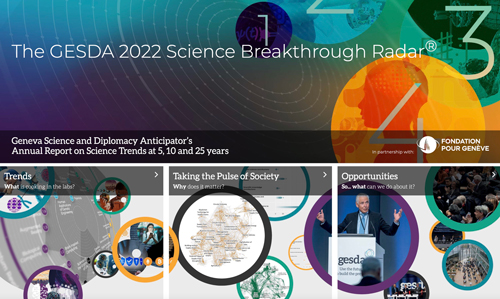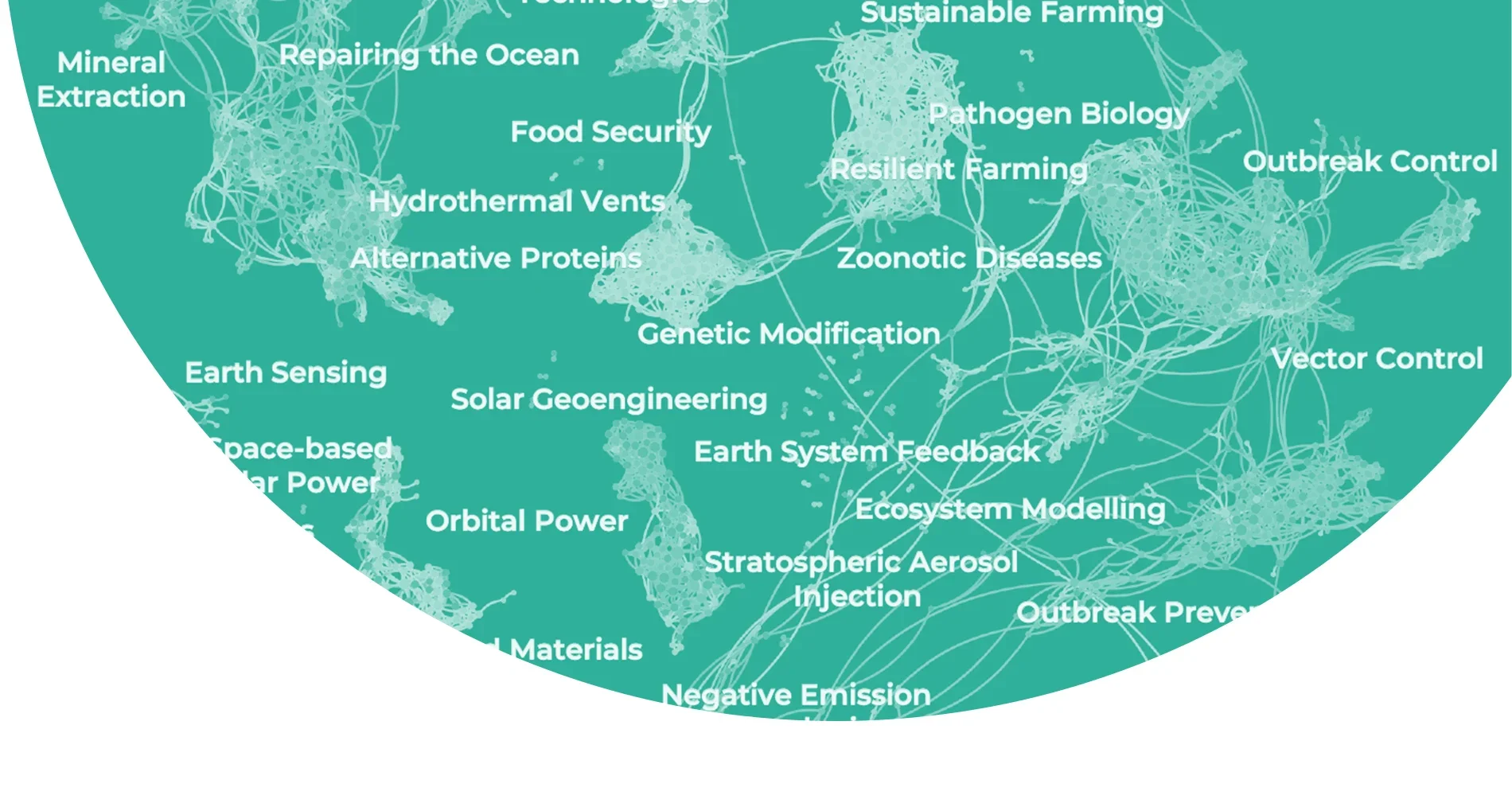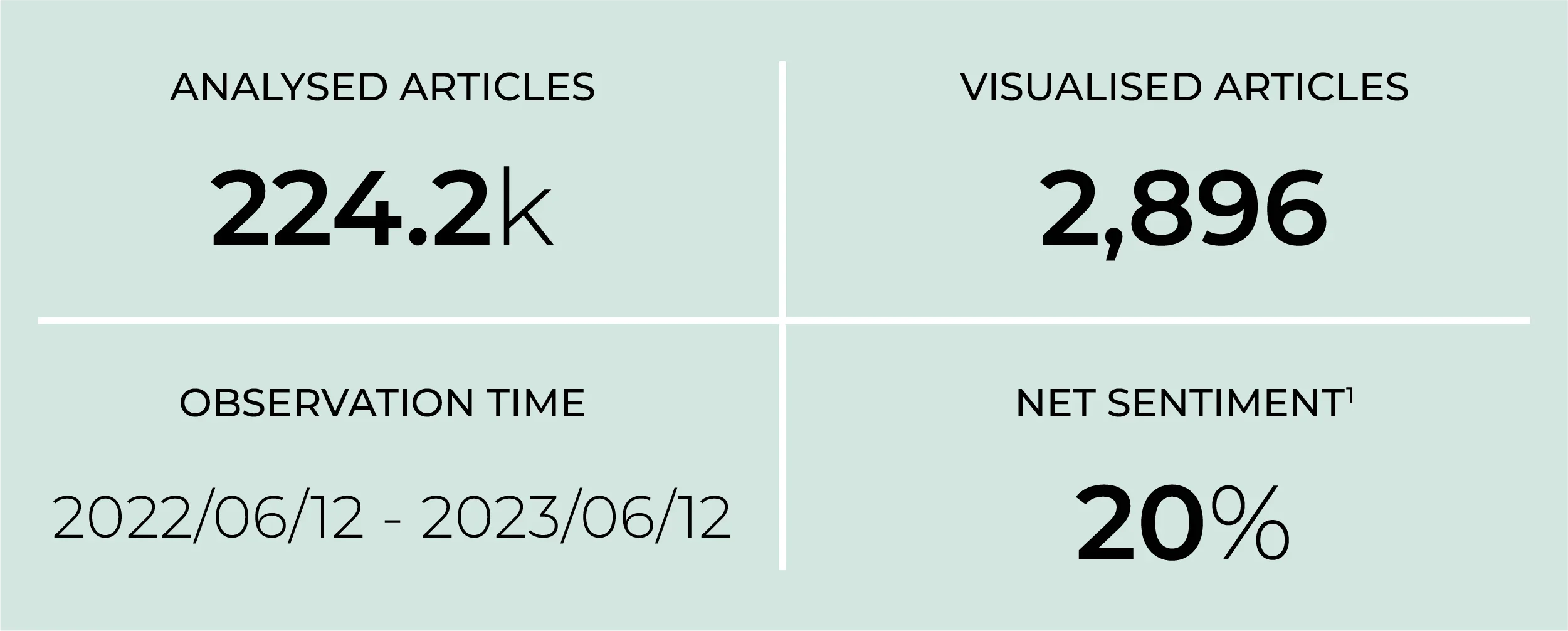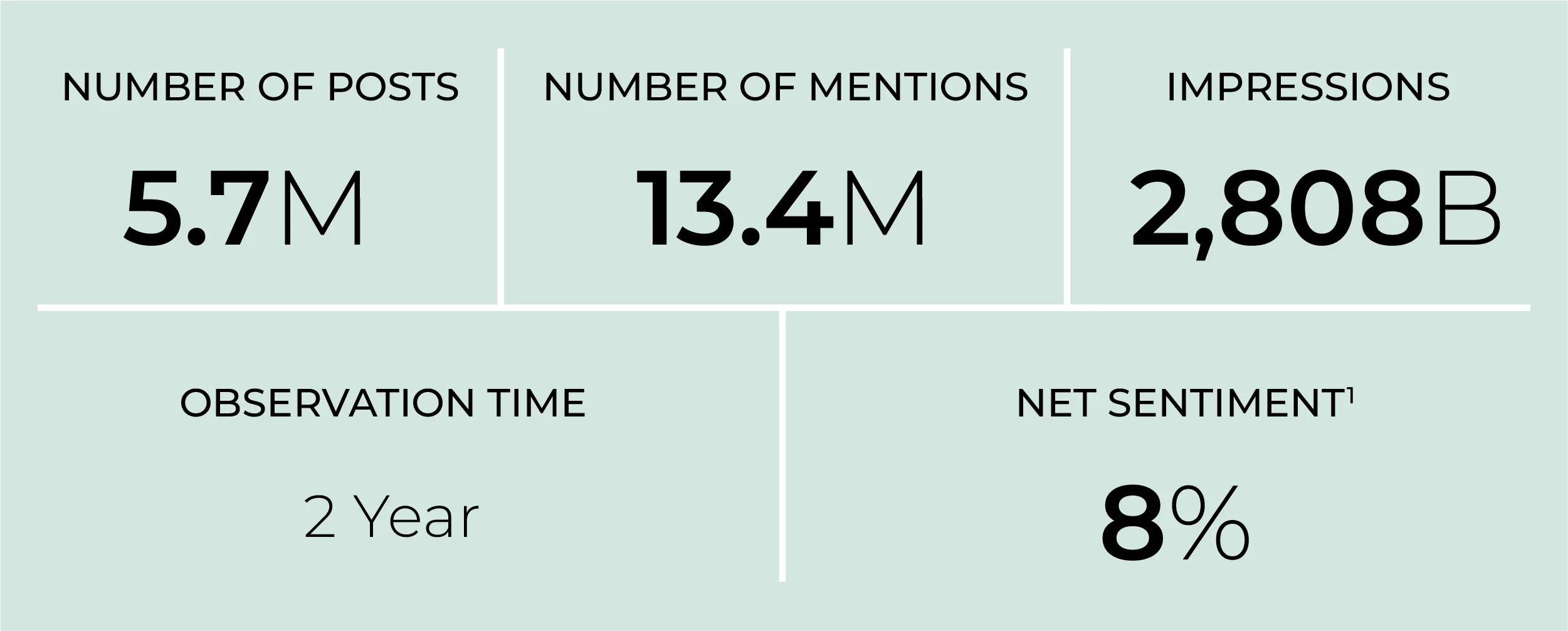Mainstream media
In the last year, a comprehensive set of 224,200 articles spanning news, blogs, and scientific publications, revealed a 20 per cent net positive sentiment while discussing eco-regeneration and geoengineering.Social media
Over a 2-year period, 5.6 million unique social media posts across various platforms, including Twitter, Reddit, and other channels focusing on language and text, addressed a wide range of topics such as decarbonisation, future food systems, deep-sea mining, and more, contributing to an overall net positive sentiment of 8 per cent.Social media: emerging hot topics and discussions
Anthropocentrism versus ecocentrism
On social media, discourse on urgent sustainability topics such as decarbonisation, the use of biodiversity, negative emission technologies and energy transition is often polarised. Narrative extremes between anthropocentric views (climate change denialism) and ecocentric viewpoints (advocation for the rights of nature) reflect the ideological struggle influencing discussions on climate change and environmental rights. The simplistic binary perception of anthropocentrism and ecocentrism is gradually being seen as insufficient, and a growing dialogue advocates for promoting a balanced view that respects both human necessities and environmental preservation.
Humanity’s treatment of outer space
In social media discussions on space exploration and resource extraction, topics like orbital powers, planetary exploration and the accompanying legal implications are frequently discussed. The debates often oscillate between viewing space as humanity's ultimate frontier and a potential site for resource exhaustion. These discussions extend to innovative concepts like solar radiation modification and Earth systems modelling, signifying increasing concern about earthly environmental challenges. Agreements like the Artemis Accords in global space governance are commonly highlighted, particularly as private entities venture into this domain.
Fungal threat
Social media platforms have become a hub for discussions on infectious diseases and fungal pandemics, raising philosophical questions about the balance between societal well-being and individual liberties. The popularity of the HBO show, The Last Of Us, depicting a fictional fungal pandemic, is fuelling these discussions, aligning with scientific research suggesting that climate change could make certain fungi more dangerous to humans.
Energy breakthroughs
As the energy landscape evolves, certain cutting-edge energy sources and delivery mechanisms have taken over the imagination in social media. Space-based solar power emerges as a visionary concept, envisioning satellites capturing abundant sunlight in space and wirelessly transmitting it to Earth. Artificial photosynthesis, inspired by nature's efficient processes, is also popular, aiming to directly convert carbon dioxide into clean fuels using sunlight. Quantum energy, leveraging advancements in quantum technologies, is thought to hold promise for revolutionising energy production and storage through enhanced efficiency and novel materials. Piezoelectric energy, derived from vibrations in infrastructure and human movement, is considered to hold promise as a unique and supplementary power source. Antimatter energy ignites imaginations with the boundless possibilities it presents. These forward-looking energy solutions have captured attention and are inspiring anticipation for the transformative energy landscape of the future.
Sentiment towards Eco-regeneration and geoengineering across the world
- Libya, the Central African Republic, and Namibia are active contributors in Africa's mixed sentiment discussions on eco-regeneration and geoengineering, reflecting a growing interest in sustainability and climate solutions.
- In the Asia Pacific region, Australia, New Zealand, the Philippines, and South Korea are notably engaged in discussions surrounding eco-regeneration and geoengineering.
- In Latin America, the discussions surrounding eco-regeneration and geoengineering have been particularly prevalent in Colombia, accounting for 50 per cent of all regional posts.
- In Europe, conversations about eco-regeneration and geoengineering have been particularly active in the UK, Ireland, the Nordic and Baltic countries, and Germany.
- In the Middle East, discussions on eco-regeneration and geoengineering have been largely concentrated in the United Arab Emirates and Turkey.
How is sentiment changing?
Mainstream media coverage has decreased In 2022, nearly 387,000 media articles were published relating to Eco-regeneration and Geoengineering, decreasing to just over 224,000 articles in 2023. Negative emissions technologies, infectious diseases and seabed extractions exhibit the greatest decreases in coverage, with ocean biodiversity, stratospheric aerosol injection and fungal outbreaks receiving the highest increases.
Social media reveals changing sentiments and demographic engagement Social Media traction amplified considerably for Fungal Pandemics, Ocean Stewardship, and Deep-Sea Mining over the past biennium, with a tenfold surge specific to Fungal Pandemics. Conversely, the focus on Infectious Diseases and Orbital Resources diminished. Infectious Diseases, however, continue to be the most prevalently discussed topic within this cluster, primarily due to their close association with the globally disruptive COVID-19 pandemic. This implies a sustained high level of public interest and concern in pandemic scenarios.
Emerging Topics
Associated Topics
Deep Sea Mining
Fungal Pandemics














